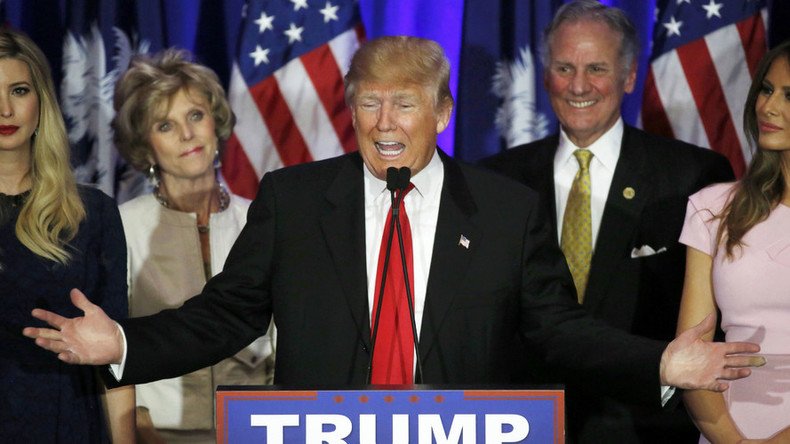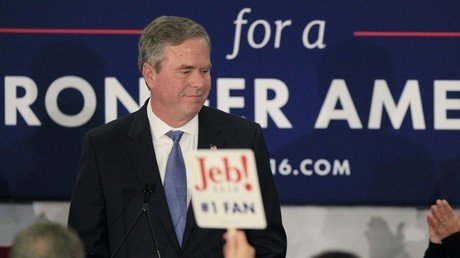‘Trump rewrites US politics rulebook’

While the media tries to figure out how to react to Trump, he himself writes his own rules. His supporters don’t care about his gaffes or whether he is probed on issues or not, said investigative journalist Patrick Henningsen, adding that it’s a new paradigm.
Businessman Donald Trump secured victory in his bid to become the Republican Party’s presidential candidate. The front-runner stormed past Ted Cruz and Marco Rubio in the South Carolina Primary. Another candidate, former Governor of Florida and George Bush’s brother, Jeb Bush has pulled out of the race.
Hillary Clinton beat Vermont Senator Bernie Sanders in the Nevada Democratic caucus.
Ted Rall, political cartoonist: “There was some doubt about Trump, and there was a sense that he was falling behind in the polls. But in the end this is definitely a decisive victory for Trump, and a very important one.”
RT: Donald Trump has bagged another victory as he cruises ahead in nationwide polls. He doesn't seem to be losing any popularity, even after all the controversial statements he's made. What's the logic behind such strong support for such a scandal-making figure?
Patrick Henningsen: You’ve got the uproar in the media, and then you’ve got the uproar from the Republican ranking file over various comments. Just this week he made a direct hit on the Bush dynasty, if you will, by calling out their weapons of mass distruction and the fact that 9/11 happened on George W. Bush’s watch. Both of those are actually true. But they hurt the pride of the GOP rank and file. These are people who like to venerate their past presidents like popes, or canonize them like they have with [Ronald] Reagan.
As you can see, it didn’t matter with Trump’s base, because Trump’s base doesn’t care whether he is being probed on issues or not. They don’t care about what he says. He has rewritten the rulebook for US politics. It is extraordinary what we’re looking at. While everyone else sits around figuring out how to react to Trump in the media, how to deal with Trump - Trump just goes along writing his own rules as he goes. And this is a new paradigm.
RT: Just a few months ago, Trump was considered a complete underdog in the race. Some Americans are still refusing to take him seriously. Is it time for a wake-up call, or are there still some cards his rivals can pull ahead of the Republican National Convention in July?
PH: In a normal race you might think so. But you have to look at the result in South Carolina: if you combine the vote of Trump, of Ted Cruz and Ben Carson – 62 percent. Basically these are outsider candidates. This is like a kind of protest vote against the establishment or politics as usual. That is a giant mandate. And if you spread that across the Democratic Party, the support that Bernie Sanders is getting as well, on both sides – left and right – there is a huge upswell. This is unprecedented in modern politics in the US, where you have populist candidates on both sides of the aisle, who are basically leading the charge, getting all the new voters out. Most of the people who voted in South Carolina were new voters – the 150, 000 extra votes. I think they had about 700,000 – the most since the 2000 election. All these extra voters are going to vote for guess who? Donald Trump. This is something they are going to factor into the math for the next primary states.
RT: Bernie Sanders is refusing to admit he's failing to attract enough voters among the black community. Why wouldn't they support him, though? Particularly after all the recent scandals over the killings of unarmed black teenagers by white police officers who essentially represent the establishment?
PH: You have to look at the fact that Hillary Clinton has been in this game in terms of national campaigning and developing a power base a lot longer than Bernie Sanders. Although, Sanders has made some incredible gains polling – and especially in the youth, the under 40 category – he is a runaway leader in this category. But when it comes to the establishment getting the endorsement from the black community, like she did in South Carolina recently, Clinton is by far and away ahead on that respect. She is also inching closer to the White House in that camp. I am not surprised that she is attracting more support on that side.
How to use Twitter and alienate people... with your host, Donald Trump https://t.co/HDMMnwu3fLpic.twitter.com/F6eWlYext9
— RT (@RT_com) February 21, 2016
RT: Even if Sanders does manage to sway the public vote in his favor, Clinton still enjoys the backing of the vast majority of super-delegates whose votes matter more. Is it really fair and indeed democratic to let the establishment have a bigger say on who can run for the presidency?
PH: This is one of the big unknown things in US politics. There are even people at the caucuses right now today in Nevada that don’t understand the super-delegate process. Quite frankly, it takes a political scientist to figure it out. This is something that was put into place around 1982 – this was something like a hangover from a very close race in the late 1960’s. And then they finally got around to putting this in. The term Democratic Party ironically is the most undemocratic of parties if you count in a super-delegate factor.
“South Carolina is especially crucial on the Republican side historically. It just isn’t possible to be a viable contender for the presidency on the Republican nomination, if you haven’t scored the top three. It was clear that Jeb Bush was not going to be a runner in the top three,” political cartoonist Ted Rall told RT.
So Bernie Sanders could very well win the popular vote. If he doesn’t win by a suitable margin – I am talking about 15-20 percent – he is not going to win the election. Even right now it is estimated she has 500 of 710 available super- delegates. What is democratic about this? What you have is that the establishment has rigged the system on the democratic side of the primary side, to make sure that no outsider candidate can make it through unless they win by a convincing margin. So this is the situation that Sanders is in. He has got to get out in front 15-20 percent in some of these big states, otherwise he will not win the nomination come convention time.
The statements, views and opinions expressed in this column are solely those of the author and do not necessarily represent those of RT.













